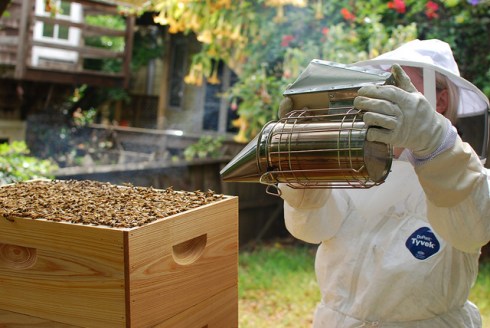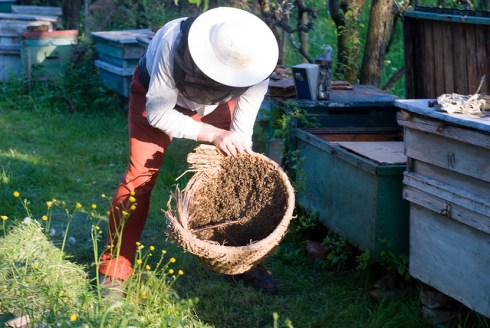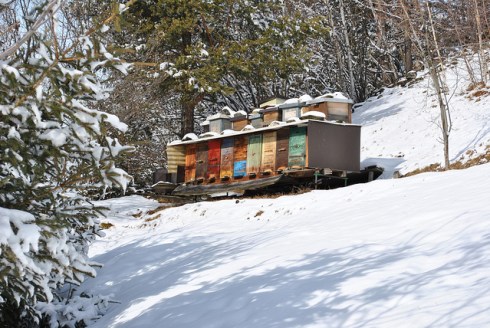
A beekeeper smokes the hive in preparation for a regular inspection. Photo Credit
Beekeeping is a wonderful and very rewarding experience. I guess you could say I was destined to become a beekeeper. After all, I was named after a honeybee. Over the years, I have had so many people ask me how to get started. Today I have decided to compile a list of ideas and thoughts to contemplate for those of you considering getting into the hobby.
Research if you are able to keep bees in your area. Inquire at your local government and see if beekeeping is allowed. Some towns require permits. Some require hive registrations and other places have zero restrictions in place.
Read all that you can. Learn about beekeeping by checking out introductory books at your local library or at the local bookstore.
Join the local club and/or take a class. Check and see if there is a local beekeeper’s organization near you. If so, often many of them offer introductory classes and pair you up with a mentor.
Ask yourself, why you would like to keep bees. There are many reasons people keep bees. Some people keep bees for the honey, others keep bees to help with local pollination and others keep bees to aid with the global honeybee crisis.
Are you afraid of being stung? You will get stung no matter how many of layers of protective garb you are wearing. Yes, even in a full bee suit with gloves. Does this matter to you? Are you okay with being stung?
Are you allergic to insect bites or stings? If this is the case, before jumping into the hobby, you might consider getting tested by an allergist to determine your reaction to honeybee stings. If your reaction is mild, there are plenty of beekeepers that tend their bees with an Epi-pen in their pocket and cell phone just in case. If you are severely allergic, you might rethink your plans.
Be a courteous neighbor. Consider asking what your neighbors think? Do they mind you tucking hives into your yard? Be ready to explain and educate them why you would like to keep bees.

This beekeeper is transferring a swarm he caught from a bee skep to a regular hive. Photo Credit.
Do you have a good location? Do you have a good spot in your yard for your bees? If not, is there another location where you can keep them? Honeybees will fly up to 5 miles as they forage for nectar and pollen but their hives should be placed in a level location, receive some sun during the day and be sheltered from strong winds. The hives should also be easy to access year-round.
Can you lift at least 25 pounds? Some hive when filled with honey can get very heavy during harvesting time. This especially happens with the most popular hive design in the U.S.- the Langstroth. Beekeeping does requires some physical strength. If you think this might be an issue, I would recommend researching other hive designs that require less lifting and strength.

Hives need to have their entrances cleared of snow after storms. Photo Credit
Can you tend to the hives year round? Do you live in one location all year-round or do you snowbird? If you are away for long periods of time, it is a good idea to have a back-up beekeeper to help check in on your hives.
Can you afford it? Getting started with beekeeping can be an expensive hobby often costing around $300 for the hive and around another $100 for bees during the first year (depending if you purchase a nuc or a package). Most folks recommend starting out with two hives for a variety of important reasons.
Are you a beekeeper? Is there anything else you think folks should consider?
About the author: Melissa is a backyard chicken keeper, beekeeper, gardener, crafter and cook. She can be found sharing on her own blog, Tilly’s Nest, as well as on Country Living Magazine, HGTV, Grit, Community Chickens, and Keeping Backyard Bees. Her first book, A Kids’ Guide to Keeping Chickens, will be available March 2015 from Storey Publishing.










19 Comments
Not a bee keeper not interested but I would like to make a suggestion while they are being a courteous neighbor to also make sure their neighbors have no severe allergies to the insects. I live in the country to bees are a fact of life but i also suffer from bee allergies the honey bee bumble bee and hornets are the worst of allergens for me. It is hard enough to avoid a sting where i live but a hive nearby could be life threatening to me. Something you may want to suggest they check before setting up shop.
JuLee, while your concerns are very valid (being allergic to stings) honey bees are (by nature) only concerned for one thing, working for the hive. We keep bees at our place in the country with over 30 homes within a mile from us. My wife is allergic to stings also and never feels worried being around 80,000+ bees flying back and forth all day long. You run a higher chance of getting a sting from a ground hive, or wasp nest because of them being in places you don’t always expect. We also have grandchildren that know they can walk near the hives without the need for protective clothing, & they know how to respect the “bees space”. Not knowing beekeeping is the biggest reason people fear bees. I suggest getting to know a local beekeeper to see how safe you can be around them.
Good thought, to protect the neighbor as well as the bee, after all bees give up their lives when they sting too. I gotcha since my daughter has an allergy to bee stings as well.
A new beekeeper would certainly need protective clothing, and a few equipment other than the hive and the bees. Please, can you include a simple cost.
website is under construction and will be up soon
Hello and greetings from Chile, I juts need to let you know if you uses water an honey or sugar to spray the girls instead of smoke them , they get really happy and the results are o is the same .
Thank you And sorry for my english
Hi,
Thank you all for posting.
I not a bee keper, hope to start you this spring.
I from Canada.
I enjoyed the article, but would suggest you mention that 25 lbs is the bare minimum a person needs to lift when using a langstroth style hive, and that’s an 8 frame shallow. A more realistic figure is 50lbs, this will allow the use of 8 frame mediums for brood chambers, and honey supers.
Save as community garden info
Might mention that Langstroth Hives are not the end-all-bee-all of hive options. There are Skep, Warre, and Top Bar Hives to list.
The Top Bar form feels more in line with a tree type cavity that bees do in the wild with fallen logs. The regular Top Bar was a little heavy & a bit bulky, and the Cathedral is is even a bit more so (picture a hive cell magnified to the size of a hive structure), but The Golden Mean is a nice moderation and not as small as a Nuc. I bought Golden Mean Top Bar hives and a Cathedral Top Bar from a natural-organic group, after taking classes. When inquiring very local, people dismiss a form out of hand, as being only by order or too expensive without any demo-models, it throws down a challenge that some would take as a negative light to new people. Any bee keeping isn’t cheap, but it is for us to be caretakers, and not necessarily Just for profit.
I can’t really read the print very well on this page because it’s nearly 1/2 way over the top of the pictures 🙁
Thanks for letting us know! Try it now!
KBB Team
how old do you have to be to be a beekeeper
Thank you for your info! I’m thinking about becoming a beekeeper and your info was helpful!
Message*just wondering if there is somewhere in my area to buy bees I live in the midland ,Odessa area
What do u think of starting out with just single brood boxes?
Bee keeping is not only a proffession but also a hobby
I’m just getting started in southeast Texas. I’m considering a spot for my hives (planning on 2 to start) on the southeast side of an elm thicket about 120 ft from my pond. I have 16 ac. 4 field and the rest woods, but there are hundreds of acres of pasture around my place. Questions: am I too far from the water and do leaf cutter ants bother bees?
researching to start raising honey bees